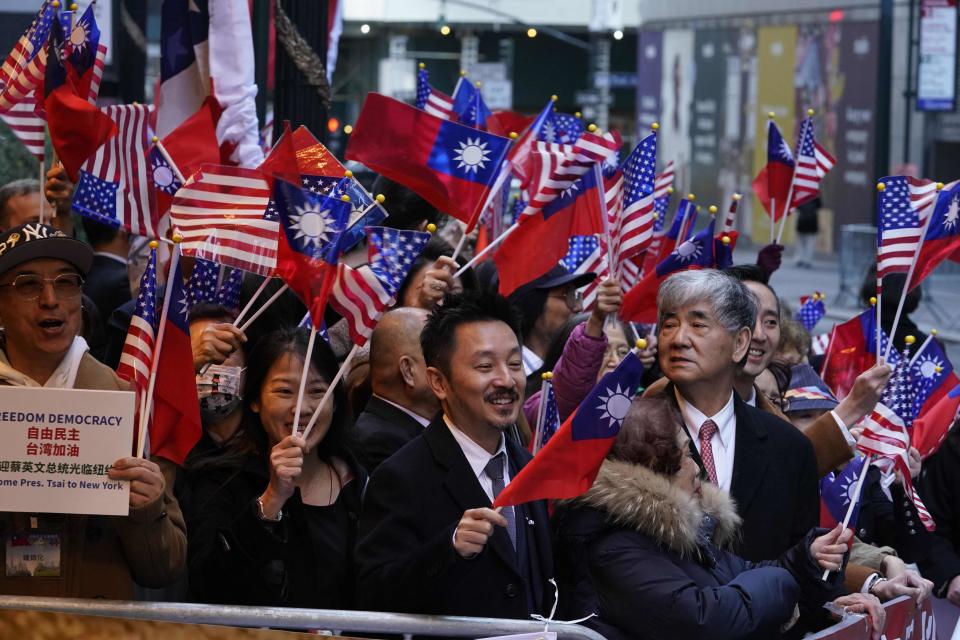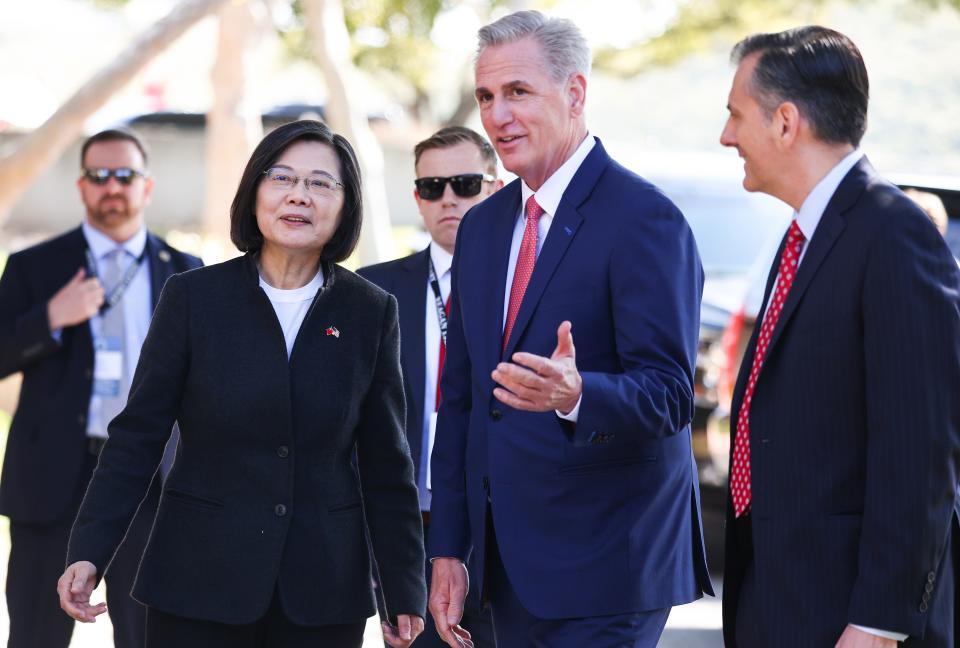House Speaker McCarthy meets with Taiwan's president and China sends warships. Now what?
- Oops!Something went wrong.Please try again later.
- Oops!Something went wrong.Please try again later.
Seldom has a visit of the leader of a small democracy provoked the degree of apprehension and anxiety that resulted from Taiwanese President Tsai Ing-wen’s trip to the United States.
China sent warships and dozens of fighter jets toward Taiwan on Saturday in retaliation for her meeting House Speaker Kevin McCarthy, with the Chinese military announcing a three-day “combat readiness patrol.”
Technically, Tsai's trip was not a visit at all but “stopovers” in New York and Los Angeles while en route to shore up ties between Taiwan and two of the remaining countries that recognize the island democracy as a legitimate government. Beyond affirmations of mutual support between Taiwan and Guatemala and Belize, the stopovers symbolized America’s commitment to stand behind Taiwan.
Opinions in your inbox: Get exclusive access to our columnists and the best of our columns
Communist 'one China' policy holds claims on democratic Taiwan
Beijing, which under its "one China" policy considers Taiwan a part of the People's Republic of China despite Taiwan maintaining its own democratic system of government since the two split after a 1949 civil war, threatened dire consequences. As if to underscore the message, the Chinese military flew combat jets over the Taiwan Strait as she left Taipei, with Beijing threatening to “resolutely hit back” if Tsai met with McCarthy.
Meanwhile, Tsai’s political rival and immediate predecessor as president, the more China-friendly Ma Ying-jeou, chose this moment to visit the mainland. Ma's trip was not an official tour but a chance to see his ancestral village and build goodwill between the two sides of the Taiwan Strait. He was accompanied by an entourage of 30 that included students, presumably because they could serve as the peacemakers of the next generation.
Threat of invasion from China: Watching bombs drop on Ukraine stirs feelings of dread for Taiwan
Elon Musk's ties to China raise security concerns: Pentagon's reliance on him grows despite his behavior
Ma heaped lavish praise on the mainland’s achievements, declaring some of them “even undreamed of.” In anathema to the view of not only Tsai’s party but also that of the overwhelming majority of Taiwan’s citizens, he declared that Taiwan is a part of China.
President Tsai, a quiet personality with a core of steel, had expressed a desire for her visit to America be kept low-key, and so it was. In New York, she was greeted by a noisy but peaceful crowd of supporters waving Taiwanese flags and an equally noisy but peaceful group of detractors waving flags of communist China, with the two groups kept apart by vigilant New York police.

A banquet held in her honor by the conservative Hudson Institute on March 30 had a closed guest list, with the invitations reading only that the dinner would be in honor of an important guest. No reporters were allowed.
Tsai also met separately with House Democratic leader Hakeem Jeffries and had breakfast with Sens. Mark Kelly, D-Ariz., Dan Sullivan, R-Alaska, and Joni Ernst, R-Iowa.
Kevin McCarthy meets Tsai Ing-wen at Reagan Presidential Library
But Beijing took particular exception to Tsai's meeting with McCarthy last Wednesday. While campaigning for his ultimately successful bid for House speaker, he said he wanted to visit Taiwan as his predecessor, Nancy Pelosi, had done. But apparently at the request of the Taiwanese government, the California Republican amended this to a meeting at the Ronald Reagan Presidential Library outside Los Angeles.
After the Taiwanese president's closed meeting with more than a dozen bipartisan members of Congress, McCarthy told a news conference that the U.S.-Taiwan bond "is stronger than at any time or point in my life,” and that he expected ties to continue to expand.

The meeting is only the latest to tighten tensions in U.S.-China relations. Beijing suspended or canceled official military dialogues and cooperation channels after Pelosi visited Taiwan last August. In February, Secretary of State Antony Blinken postponed an imminent trip to China because, as Biden administration officials said, a Chinese surveillance balloon drifting over America was a "clear violation" of sovereignty and international law.
Is Pelosi's visit to Taiwan risky?: Yes, but she can deliver strong messages to China
It's bigger than a surveillance balloon: Chinese spying in US includes research labs and universities
Tsai has arrived safely back in Taipei, having demonstrated her determination not to allow Beijing to isolate her country diplomatically as well as a reaffirmation of bipartisan support from Washington. But the drama is not over.
According to China’s Global Times: “The final outcome will undoubtedly be that every provocation by Washington will be met with the Chinese side's resolute countermeasures, and every act of 'Taiwan independence' by Tsai ... will result in tighter constraints on them.”
Opinion alerts: Get columns from your favorite columnists + expert analysis on top issues, delivered straight to your device through the USA TODAY app. Don't have the app? Download it for free from your app store.

The opening round came on the same day of Tsai's meeting with McCarthy: China’s maritime safety administration announced Wednesday that it had begun on-site inspections of cargo ships and construction vessels in the Taiwan Strait – which is legally international waters but which Beijing refuses to recognize as such. Taiwan has said that it will not comply. It has notified shipping operators that if they encounter such requests, they should refuse and immediately notify Taiwan’s coast guard for assistance.
China’s military declared Monday that it is “ready to fight” after completing three days of large-scale combat exercises around Taiwan that simulated sealing off the island. But there has not been a reaction from the U.S. House speaker.
The implications for peace in the Taiwan Strait and beyond are ominous. How will Tsai’s new allies in Washington react now?
June Teufel Dreyer, a senior fellow of the Foreign Policy Research Institute, is a political science professor at the University of Miami.
You can read diverse opinions from our Board of Contributors and other writers on the Opinion front page, on Twitter @usatodayopinion and in our daily Opinion newsletter. To respond to a column, submit a comment to letters@usatoday.com.
This article originally appeared on USA TODAY: China sends warships after House Speaker McCarthy meets Taiwan leader

